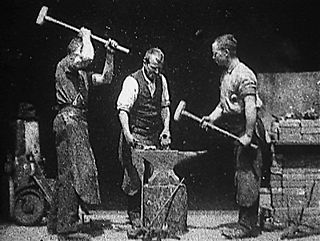
Blacksmith Scene is an 1893 American short black-and-white silent film directed by William K.L. Dickson, the Scottish-French inventor who, while under the employ of Thomas Edison, developed one of the first fully functional motion picture cameras. It is historically significant as the first Kinetoscope film shown in public exhibition on May 9, 1893, and is the earliest known example of actors performing a role in a film. 102 years later, in 1995, Blacksmithing Scene was selected for preservation in the United States National Film Registry by the Library of Congress as being "culturally, historically, or aesthetically significant". It is the second-oldest film included in the Registry, after Newark Athlete (1891).
Chulas Fronteras is a 1976 American documentary film which tells the story of the norteño or conjunto music which is played on both sides of the Mexico–Texas border. It was directed by Les Blank. A CD soundtrack of the music played in the film is also available, under the same title.

The Cool World is a 1963 feature film directed by Shirley Clarke about African-American life in the Royal Pythons, a youth gang in Harlem. In 1994, the film was selected for preservation in the United States National Film Registry by the Library of Congress as being "culturally, historically, or aesthetically significant".

Fatty's Tintype Tangle is a 1915 comedy short film. A man (Fatty), tired of his mother-in-law's henpecking, leaves home in anger and sits on a park bench, where a photographer takes a picture of him sitting next to a married woman, whose husband is not pleased. Conflict ensues.
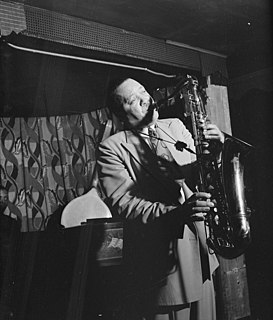
Jammin' the Blues is a 1944 American short film made by Gjon Mili and Norman Granz in which a number of prominent jazz musicians re-create the jam-session atmosphere of nightclubs and after-hours spots. It features Lester Young, Red Callender, Harry Edison, Marlowe Morris, Sid Catlett, Barney Kessel, Jo Jones, John Simmons, Illinois Jacquet, Marie Bryant and Archie Savage.
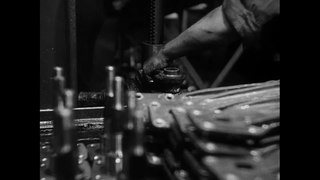
Master Hands is a 1936 sponsored documentary film short which shows what work is like in a Chevrolet automobile factory. It was produced by the Jam Handy Organization, a pioneer in industrial film production.
Tulips Shall Grow is a 1942 American animated short film in the Puppetoons series, directed by George Pal and starring Rex Ingram and Victor Jory. It was released by Paramount Pictures and originally photographed in 3-strip Technicolor. It later became the black-and-white edition by National Telefilm Associates.
From Stump to Ship is an amateur industrial film by Alfred K. Ames, former State Senator and owner of the Machias Lumber Company, in Machias, Maine as well as by Dr. Howard Kane of Washington, DC. The half-hour 16mm film was shot over the winter of 1930 in the logging woods and shows logging in the forest with hand tools and horses, then moves to the spring log drive, with loggers using peaveys to break up log jams on icy rivers as the logs are moved from the forest to the mill. Detailed views of mill work, changing the bandsaw, and making shingles. Lumber is loaded onto schooners in Machias for transport to New York. The film was originally silent, with a typed script which Ames read aloud when he showed the film. In 1985, with funds from the Maine Humanities Council, the narration was recorded with the film. The film is distributed by Northeast Historic Film, in Bucksport, Maine. Footage was included in the compilation documentary Woodsmen and River Drivers, Another Day, Another Era which also interviewed the surviving woodsmen of the Machias Lumber Company.
Fuji is a 1974 American animated short by Robert Breer.
Soundies are three-minute American musical films, produced between 1940 and 1947, each displaying a song, dance, and/or band or orchestral number. Produced professionally on 35 mm black-and-white film, like theatrical motion pictures, they were printed on the more portable and economical 16 mm film.

Princess Nicotine; or, The Smoke Fairy is a 1909 five-minute silent film directed by J. Stuart Blackton.
Whitey's Lindy Hoppers was a professional performing group of exceptional swing dancers that was first organized in the late 1920s by Herbert "Whitey" White in the Savoy Ballroom and disbanded in 1942 after its male members were drafted into World War II. The group took on many different forms and had several different names and sub-groups, including Whitey's Hopping Maniacs, Harlem Congeroo Dancers, and The Hot Chocolates. In addition to touring nationally and internationally, the group appeared in several films and Broadway theatre productions. Dorothy Dandridge and Sammy Davis Jr. were among the group's celebrity regulars.
OffOn is an experimental film created by Scott Bartlett made and released in 1968.
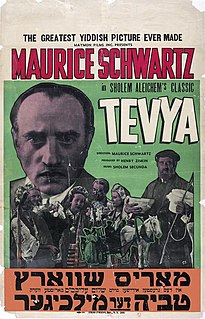
Tevya is a 1939 American Yiddish film, based on author Sholem Aleichem's stock character Tevye the Dairyman, also the subject of the 1964 musical Fiddler on the Roof. It was the first non-English language picture selected for preservation by the National Film Registry.

Garlic Is as Good as Ten Mothers is a 1980 documentary film about garlic directed by Les Blank. In 2004, the film was selected for preservation in the United States’ National Film Registry by the Library of Congress as being “culturally, historically, or aesthetically significant.” The Academy Film Archive preserved Garlic Is as Good as Ten Mothers in 1999.
Snader Telescriptions, produced for television from 1950 to 1952, were film versions of popular and classical music performances. Singers, dancers, orchestras, and novelty acts appeared in the Snader musicals. They were produced by Louis D. Snader, a Southern California theater owner who branched out into television and then real estate. Lionel Hampton was announced as the first "music world personality to face video film cameras" in the July 22, 1950 issue of Billboard.
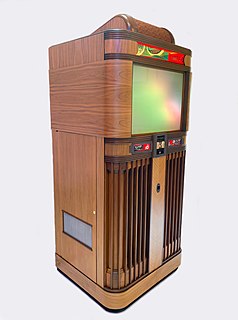
Panoram was the trademark name of a visual jukebox that played short-filmed musicals popular within the United States during the 1940s. It was conceived and produced by the Mills Novelty Company under several patents including 123,473 and 2,286,200, which involve the cabinet design and endless reel workings. Development took place in the late 1930s with production and sales beginning in 1940. A Grand Premiere took place on September 16 - 19, 1941 in Hollywood, California. The company wrote over $3 million in Panoram orders that week. The Panoram used RCA projectors, amplifiers, and speakers. The successful launch of the Panoram allowed for the largest single order of these RCA products up to that time.
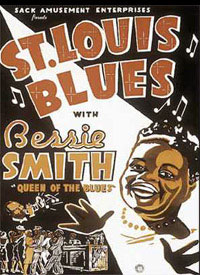
St. Louis Blues is a 1929 American two-reel short film starring Bessie Smith. The early sound film features Smith in an African-American speakeasy of the prohibition era singing the W. C. Handy standard, "St. Louis Blues". Directed by Dudley Murphy, it is the only known film of Bessie Smith, and the soundtrack is her only recording not controlled by Columbia Records.
Hands Up! is a 1926 American silent comedy film directed by Clarence Badger, co-written by Monte Brice and Lloyd Corrigan, and starring Raymond Griffith, one of the great silent movie comedians.
The Cappy Barra Harmonica Band was an American harmonica ensemble — originally a trio, then a quartet, then two groups — that played big band arrangements. Cappy Barra flourished from 1935 to 1945.









